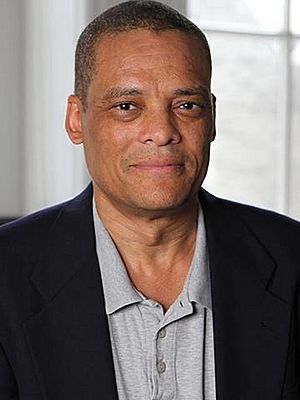Larry Gladney facts for kids
Quick facts for kids
Larry Gladney
|
|
|---|---|
 |
|
| Born | 1957 |
| Nationality | American |
| Alma mater | Northwestern University (B.A.) Stanford University (PhD) |
| Scientific career | |
| Fields | Particle physics Cosmology |
| Institutions | Yale University (current) University of Pennsylvania |
| Thesis | Measurement of the lifetimes of the neutral and charged D mesons (1985) |
Larry Donnie Gladney (born 1957) is an American scientist. He studies tiny particles and the universe. He is known as an experimental particle physicist and a cosmologist. In 2019, he became a physics professor at Yale University. He also works as the Phyllis A. Wallace Dean of Diversity and Faculty Development there.
Before Yale, he was a professor at the University of Pennsylvania. His research looks at how the universe began and expanded after the Big Bang. He also studies how matter, energy, space, and time are connected. Dr. Gladney has won many awards. He was also part of a project called HistoryMakers. This project records the stories of African Americans who have made important contributions to U.S. history.
Contents
Larry Gladney's Life Story
Larry Gladney was born in 1957 in Cleveland, Mississippi. His mother, Annie Lee Gladney, raised him in East St. Louis, Illinois. He went to school there and finished high school in 1975.
He then went to Northwestern University. He earned a bachelor's degree in physics in 1979. Later, he earned his Ph.D. in physics from Stanford University in 1985.
His Career in Academia
From 1985 to 1988, Dr. Gladney worked at the University of Pennsylvania. He then joined the faculty there. He became a full professor in 2005. He later led the physics department.
At Penn, he also helped with a group that supported African-American students and faculty. He was also an associate dean for Natural Sciences. He even taught education to graduate students. While at Penn, he helped teach science to students in Philadelphia schools. In 2019, he moved to Yale University. He became a physics professor and a dean there. Yale created this dean position to help make the university a welcoming place for all students.
His Work in Physics
Larry Gladney is an expert in astro-particle physics and cosmology. These fields study the universe and its smallest parts. He also works in experimental particle physics. This means he does experiments to learn about tiny particles.
He has done a lot of research on weak interactions of heavy quarks. Quarks are very tiny building blocks of matter. He also studies dark energy, which is a mysterious force that makes the universe expand faster.
Important Discoveries
One of his early big discoveries happened in the 1980s. He studied particles called bottom hadrons at the Collider Detector at Fermilab (CDF). More recently, he has been involved with the Vera C. Rubin Observatory. This observatory is building a huge telescope in Chile. It will help scientists measure how the universe has expanded over time.
Leadership in Science
Dr. Gladney has also served on many important science committees. These include groups for the National Science Foundation and the Department of Energy. He has also advised major labs like the Lawrence Berkeley National Laboratory and the Stanford Linear Accelerator Center. He was also on the committee for the Laser Interferometer Gravitational-Wave Observatory (LIGO). LIGO searches for ripples in space-time called gravitational waves.
Awards and Recognition
Larry Gladney has received many awards and honors for his work. From 1989 to 1994, he was a Presidential Young Investigator. This is a special award from the National Science Foundation. In 1990, he won a Lilly Teaching Fellowship.
In 1997, he received the Edward A. Bouchet Award from the American Physical Society. He also received the Martin Luther King, Jr. Lecturer Award from Wayne State University. Students at the University of Pennsylvania gave him an award for his excellent community service. They recognized his efforts to guide and support young scholars.
 | Anna J. Cooper |
 | Mary McLeod Bethune |
 | Lillie Mae Bradford |

